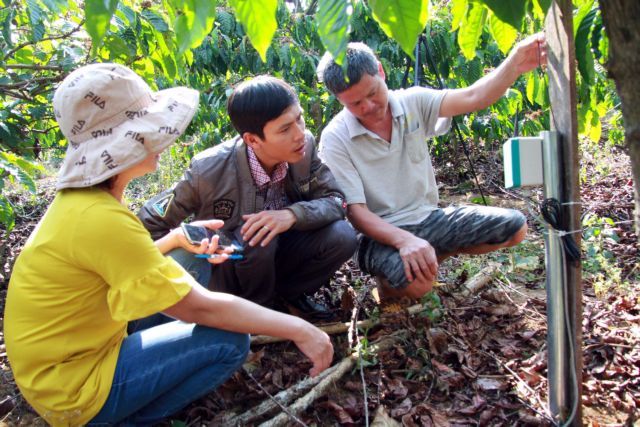 Society
Society


|
| Famers use efficient irrigation equipment for their coffee crop in Lâm Đồng Province. VNA/VNS Photo Đặng Tuấn |
ĐẮK LẮK — The Tây Nguyên (Central Highlands) provinces should speed up the use of efficient irrigation technologies to mitigate the effects of droughts and water shortages, Nguyễn Văn Tỉnh, head of the Irrigation Department, has said.
Speaking at a conference held in Đắk Lắk Province on Tuesday, he said the provinces targeted to have 500,000ha of crops irrigated using efficient irrigation systems by 2020.
“To meet the target, the provinces need to have comprehensive solutions to develop efficient irrigation systems for plants and have policies to support farmers to expand the use of advanced and efficient irrigation technologies.”
The Tây Nguyên region, which comprises Kon Tum, Gia Lai, Đắk Lắk, Lâm Đồng and Đắk Nông provinces, has the largest areas under high-value perennial cash crops such as coffee, pepper and rubber in the country.
It had nearly 622,300ha under coffee, more than 91,400ha under pepper, 246,800ha under rubber, and 81ha under cashew last year, according to the department.
It has 1,190 reservoirs, 970 dams, 130 pumping stations, and 70 other irrigation works which can together irrigate nearly 290,000ha, or more than 20 per cent of farm lands.
In recent years, inclement weather and prolonged dry seasons have caused a dramatic decline in water resources, including groundwater, available for irrigation.
A large number of farmers still irrigate their crops using traditional methods that require large quantities of water, worsening the shortage.
Nguyễn Như Hiến, deputy head of the Plant Cultivation Department’s Southern Office, said perennial cash crops like coffee, pepper, cashew and rubber have proved their economic worth.
They had improved the lives of hundreds of thousands of families, he said.
In the context of the shortage of irrigation water in the dry season, the use of efficient irrigation systems and their effective exploitation were necessary for agricultural development, he said.
Efficient systems include drip and spray irrigation.
They can reduce water and fertiliser use by 20 per cent and labour cost by 30 per cent compared to traditional irrigation methods, according to the Western Highlands Agriculture and Forestry Science Institute.
In recent years, the Tây Nguyên provinces have encouraged farmers to use efficient irrigation systems through support policies such as subsidising their installation.
In Lâm Đồng, 28,000ha of crops use such systems, accounting for 10 per cent of the province’s total farming area, according to its Department of Agriculture and Rural Development. — VNS




